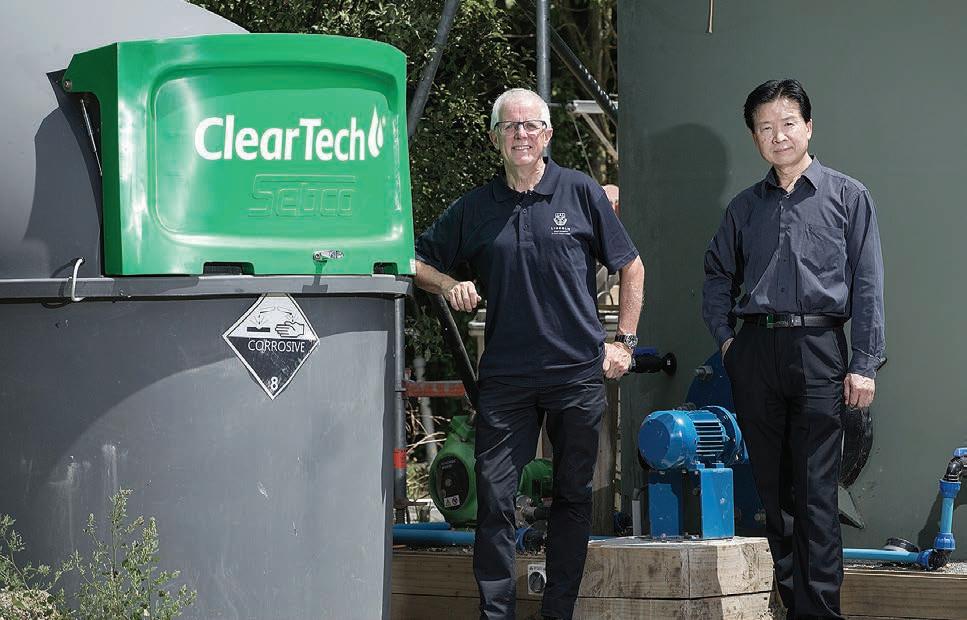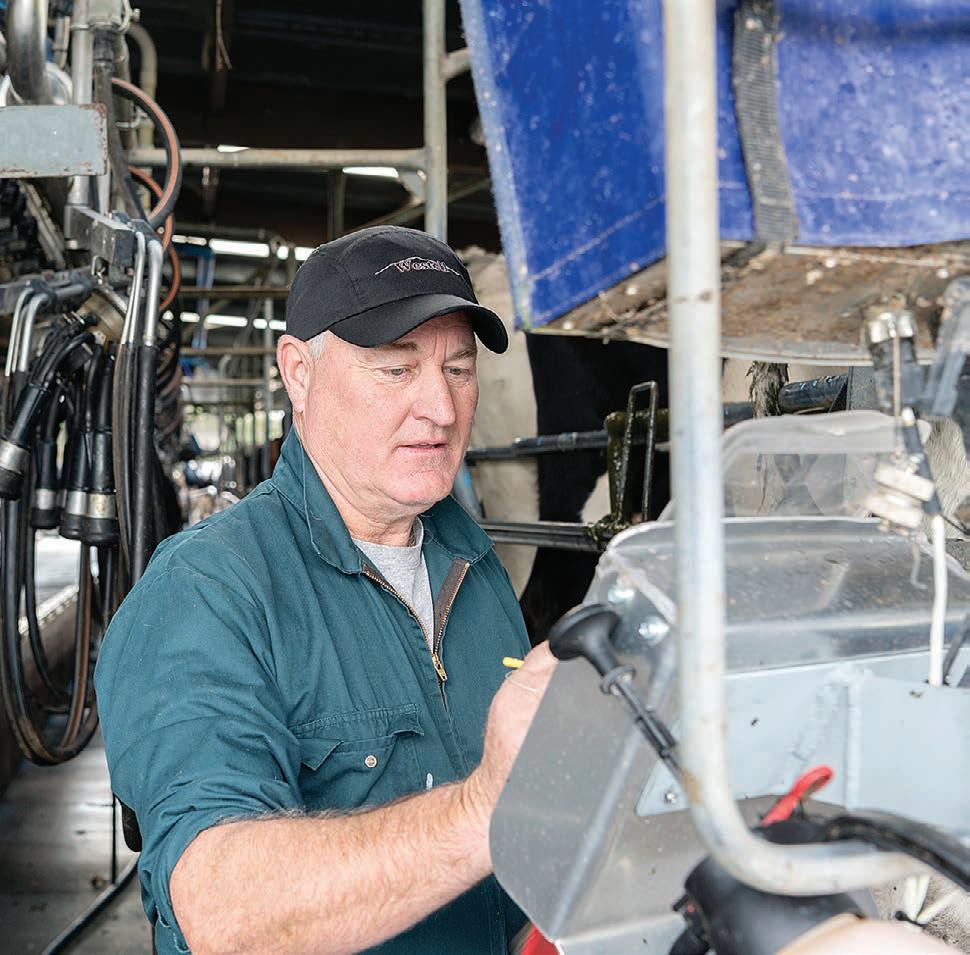
4 minute read
Technology
from Dairy Farmer November 2020
by AgriHQ
Water saving technology
By Tony Benny
Award-winning ag tech can halve the amount of freshwater used on farms and has the potential to save billions of litres each year.
Dairy farmers will be able to halve the amount of water they use washing down their yards thanks to new technology developed by Lincoln
University scientists and commercial partner Ravensdown.
The ClearTech effluent treatment system has been installed at the Lincoln
University Dairy Farm and in its first month in action, more than 600,000 litres of water was saved.
“Our plant has been fully operational since the start of milking and already the amount of freshwater we’ve saved is remarkable. We’re saving at least 50% of the water used to wash the yard,” farm manager Peter Hancox says.
Over the whole 10-month season,
Hancox says, water savings are expected to total 6 million litres.
Soil science professors Keith Cameron and Hong Di, and Ravensdown, developed the system which collects the effluent and treats it with a coagulant to bind effluent colloidal particles together to settle them out from the water.
The treated water can then be recycled, with the leftover treated effluent being safely used to recycle nutrients back to the pasture without odour. The ClearTech system also reduces pressure on effluent storage capacity and reduces leaching losses of phosphate and E.coli from the treated effluent when spread on the land.
“These are huge benefits for farmers, with really significant implications for farmers’ relationships with the natural environment and their local communities,” Hancox says.
He believes the set-up and maintenance costs are far outweighed by benefits to both the farm and the wider community.
“Every litre of wastewater recycled is a litre of freshwater saved,” he says.
The system comprises computer Professors Keith Cameron and Hong Di with the Lincoln University Dairy Farm ClearTech effluent treatment system.
Lincoln University farm manager Peter Hancox says the ClearTech system has huge benefits for farmers.

processors, controllers, tanks, pumps and pipes, and sits between the dairy yard and effluent pond.
Ravensdown estimates that if ClearTech was used on all New Zealand dairy farms, total fresh water use could be reduced by up to 42 billion litres a year, the equivalent of 17,000 Olympicsized swimming pools
“Farmers want to do the right thing and ClearTech delivers us a system where we can make a real difference to our environmental impact, without busting the budget and with no disruption to our normal farm operations,” Hancox says.
The system won the Science & Research Award at the Primary Industries Awards in 2019, the South Island Agricultural Fieldays Agri-Innovation Award and a Highly Commended Award at the 2019 National Fieldays Innovation Awards. n
Importance of herd monitoring
Allflex Livestock Intelligence, MSD and IDEXX are changing the game of animal health in a new Tech Talk and Eradicating BVD workshop series for Dairy Women’s Network members and farmers nationwide.
The workshops will focus on Allflex’s monitoring system technology and how that technology can help with heat detection, as well as overall animal health.
The second part of these free threehour practical sessions will cover the importance of the Bovine viral diarrhoea (BVD) dairy framework, as well as some information about BVD from the MSD Animal Health team and IDEXX.
Attendees will receive insights into Allflex’s collar technology – what, how and why the technology is used; BVD testing and vaccination strategies, and how both Allflex collars and BVD testing ultimately have a positive impact on a farmer’s bottom line.
“This season we are seeing an increase in monitoring enquiries and sales as farmers are quickly seeing the benefits of using a monitoring system. There is good value in monitoring your herd, not just to detect heat but to provide accurate and early insights into individual cow health, meaning fewer down cows and more days in milk,” Allflex’s national sales manager Austin Heffernan says.
“These workshops are a great chance for those farmers who are interested to ask any questions directly to a farmer who is using the technology in a farmerto-farmer knowledge share.”
Following the new partnership between IDEXX and the Dairy Women’s Network, IDEXX representatives have come on board to showcase the ease and success of testing for BVD in successful control programmes nationwide.
IDEXX is excited to be working with DWN, MSD and Allflex on this important initiative. Infectious diseases, especially BVD, negatively impact productivity and fertility on-farm. Together with this new partnership, IDEXX hopes to make Te Awamutu farmer David Harker uses the Allflex monitoring system to track the health of his herd. Photo: Allflex Livestock Intelligence

significant improvements to improve the health and wellbeing of New Zealand livestock.
“We want to equip our farmers with the knowledge to protect herd health. Utilising technology such as Allflex collars is a big part of that. When it comes to BVD eradication implementing a strong testing and vaccination programme is key – we want attendees to understand how this disease works so that they can make decisions in the field and adapt when they need to,” Dairy Women’s Network chief executive Jules Benton says.
Six workshops will be held at farms around the country, with the first session in North Otago on November 3. Following sessions will be held in “There is good value in monitoring your herd, not just to detect heat but to provide accurate and early insights into individual cow health, meaning fewer down cows and more days in milk.” Austin Heffernan
Manawatu, Southland, Waipa, South Waikato and Kaipara.
Visit dwn.co.nz/events for more information on the workshops and to register.










